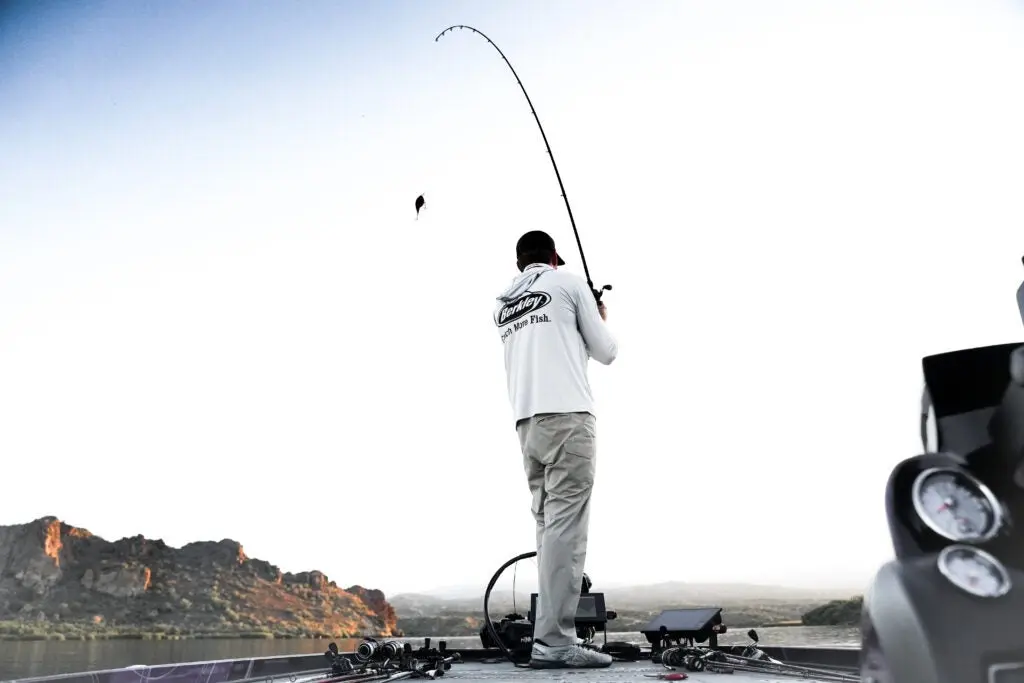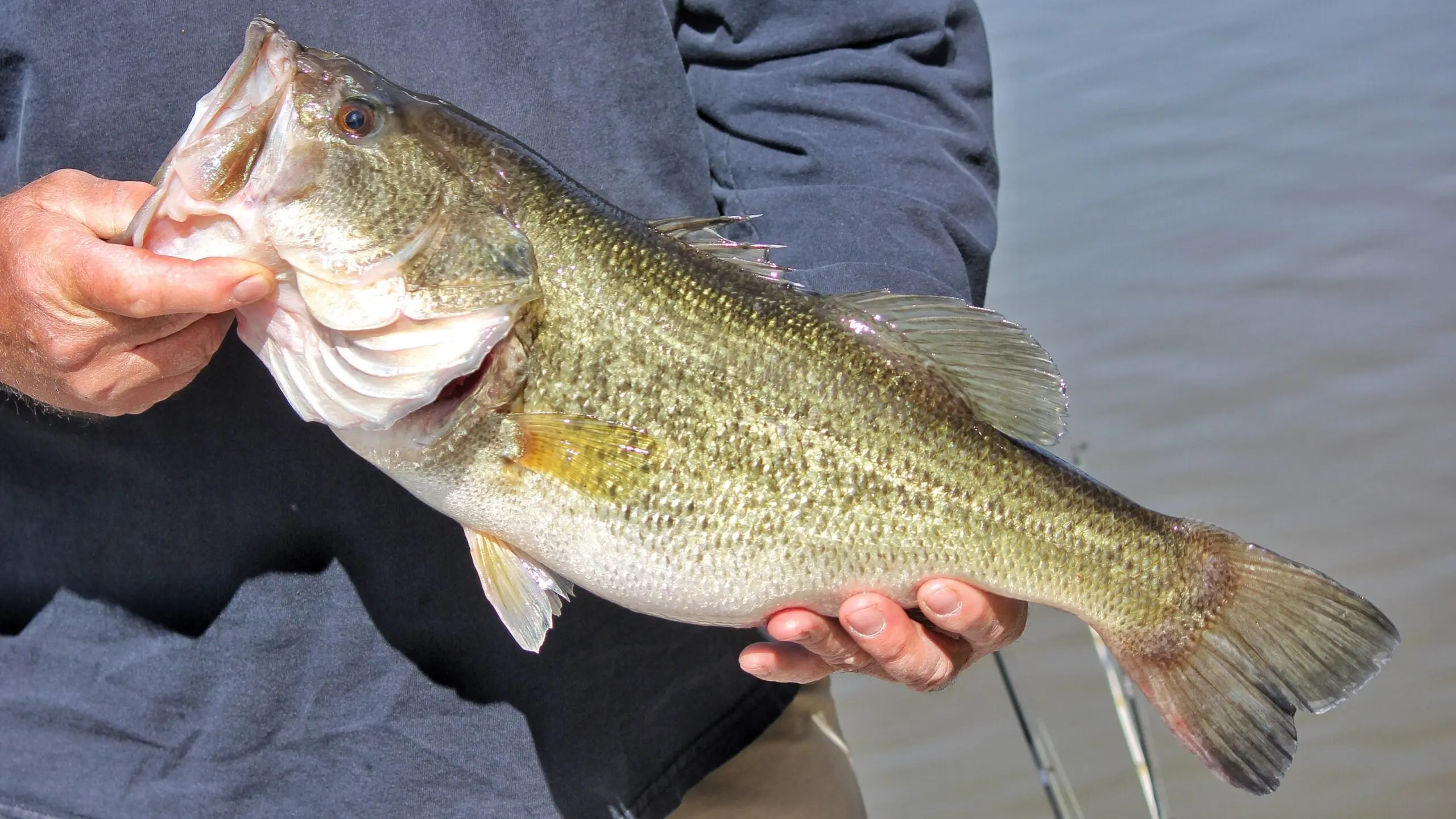One of the reasons bass are such popular gamefish is because you can catch them just about any time you want. Bass will bite to some degree all throughout the winter, spring
, summer
, and fall. You can catch a largemouth in a foot of water in Alabama during the heat of summer or under ice in Michigan in the dead of winter. But if your goal isn’t just to catch a bass, but to catch as many as you can, then the question becomes: when is the best time to fish for bass?
Although bass are literally biting somewhere every minute of every day, there are certain times in certain locations where they definitely bite better. So, let’s run through them. Here are the best times to fish for bass during each day and throughout the season so you can make the most of every outing.
Best Times of Year to Fish for Bass
As a general rule of thumb, bass bite better in the spring and fall. All black bass, including spotted, smallmouth, and largemouth bass, are cold blooded, of course, and this means that water temperature dictates how active and aggressive these fish will be
.
Bass bite best when the surface water temperature is between 55 and 75 degrees. In the winter, the water in most places falls well below this range. And in the summer, it gets far hotter than this in shallow water. Bass can still be caught in these seasons, especially when targeting them deeper in water that tends to stay in the 62- to 70-degree range for a longer portion of the season. But the bass bite better throughout a fishery in the spring when surface temps jump up above 55 and again in fall when temps dips below 75.
The Spawn
Bass also spawn in the spring
, making them more accessible to anglers fishing in shallow water. Generally speaking, the spawn occurs earlier in the South. Water temperature also plays a significant role in the spawn. Again, the ideal spawning temperature will differ based on what region of the country you’re in. Northern bodies of water will have a lower spawning temperature than southern fisheries. It is important to dial in on what temperature range triggers spawning activity and be on the water when that occurs. Dedicated anglers will chase the spawn all spring and continue fishing during the post-spawn. Be sure to follow along with the best days of the spawn
in your region of the country for the most productive fishing.
Best Time of Day to Fish for Bass

Early morning is almost always a great time to be on the water. Berkley
Throughout the year, the first half hour after sunrise and the last half hour before sunset tend to be great feeding windows. But keep in mind that the time of day when bass bite best fluctuates depending on the season.
When the water is warm from late spring through early fall, the bite stays strong in the mornings but usually dies off around 10 a.m. It will often pick back up a bit around 1 p.m. in the summer when the sun is at its highest, and the shade is tight. Shallow-water bass will seek shelter from the hot sun in these isolated areas of deep shade and are, therefore, easier to find and target. The bite usually peaks again in the evening as the sun fades and surface temps moderate.
In the winter, the morning bite is typically followed by a midmorning lull, as the frigid waters make the lethargic bass slow to react to passing baits. The best bite window of the day when the water is cold typically comes between 10 a.m. and 2 p.m., when the sun is high and warms the water to its peak temperature for the day.
Situational Feeding Windows for Bass

Lunar phases, current, and barometric pressure can all play a roll in catching more fish. Shaye Baker
Several variables besides water temperature can affect the best time to fish for bass, day to day and throughout the year. Lunar and solar calendars
, for example, have been used for decades, if not centuries, to form best guesses on when bass and other animals will be the most active.
Lunar phases affect tidal fisheries the most, with water rising and falling throughout each day. Both bass and bait are most concentrated on a low tide, and they bite best in these situations when the water is warmer. The current generated from incoming and outgoing tides also positions fish in current breaks, making these great situational feeding windows simply because of how the bass are positioned and on the lookout for prey moving past them.
Current also plays a huge role when looking for bite windows on impoundments with dams that generate current to produce electricity. When the water is stagnant and still, the bass scatter, suspend, and become hard to catch. But when the generators fire up and the water starts to move, the bass set up in current breaks and feed heavily on bait as it is swept by. So, a sudden influx of current can generate a feeding frenzy regardless of the time of day.
Weather is another variable that can key fish up at any time and in any season. Bass bite best when the water is warm and the barometric pressure is low or falling. This typically happens as a front approaches. Then, as the pressure rises after the front, the fishing becomes increasingly tough as the bass become less active.
Pay Closer Attention to Catch More Bass
In the end, there’s never really a bad time to go fishing. As the old saw goes, a bad day on the water is better than a good day at work. But there are certainly times when the bass bite better. Early and late are always good, as are spring and fall, with other daily bite windows fluctuating depending on the season and water temps. Current, weather, tide, and moon phase can all create concentrated feeding windows as well.
A final tip to leave you with when comes to the best time to fish for bass is to pay attention to other animals in the area where you fish, as they tend to operate on similar cycles. If you hear the birds chirping and the squirrels scampering through the woods, chances are the bass are active, too. If it’s dead still and quiet all around, the bite will likely be tough. And keep and eye out for those rare times when all the variables—water temps, time of day, current, barometer, other critter activity—all come together at the same time, and be ready to hit the water for a banner day.
![Field & Stream [dev]](https://images.ctfassets.net/fbkgl98xrr9f/1GnddAVcyeew2hQvUmrFpw/e4ca91baa53a1ecd66f76b1ef472932b/mob-logo.svg)

